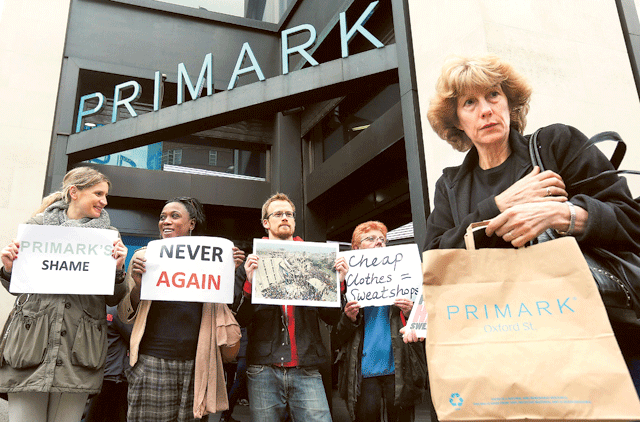
Dubai: Canada’s Loblaw Companies Ltd became the second Western fashion retailer to promise compensation for the families of victims of the Bangladesh garment factory collapse that killed nearly 400 people last week.
Loblaw, which had some of its Joe Fresh clothing line manufactured at Rana Plaza, followed British retailer Primark in offering to compensate victims of the South Asian country’s worst industrial accident.
“We will be providing compensation for the families of victims who worked for our supplier,” said spokeswoman Julija Hunter in an email sent to Reuters.
“We are working to ensure that we will deliver support in the best and most meaningful way possible, and with the goal of ensuring that victims and their families receive benefits now and in the future.”
Eight people, including four factory bosses, have been arrested over the collapse of the building last Wednesday.
The building’s owner, a local leader of the ruling party’s youth front, appeared in court on Monday and police are looking for another factory boss, David Mayor, who they said was a Spanish citizen.
Some 2,500 people have been rescued but emergency workers say there is now little hope of finding anyone else alive in the rubble of the eight-storey plaza, which officials said had been built on swampy ground without the correct permits.
Bangladesh is the world’s second-largest garment exporter after China. The collapsed complex housed a number of factories that made clothing for Western brands.
Unaccounted for
Hundreds of the mostly female workers who are thought to have been inside the building when it caved in remain unaccounted for.
Loblaw has said it regularly conducts audits to ensure its garments are manufactured responsibly, but focuses on labour practices and not building construction.
Loblaw said it would issue updates as it developed details of its compensation plan.
“Our priorities are helping the victims and their families, and driving change to help prevent similar incidents in the future,” Hunter wrote.
Primark, owned by FTSE 100 company Associated British Foods, said that it was working with a local NGO to help victims of the disaster.
It pledged to provide long-term aid for children who lost parents, financial aid for the injured and payments to victims’ families.
In November, a fire at the Tazreen Fashion factory in a suburb of Shaka killed 112 people. Such incidents have raised questions about worker safety and low wages in the poor South Asian nation, which relies on garments for 80 per cent of its exports.
Working conditions
Loblaw was one of several Canadian retailers that met yesterday with the Retail Council of Canada to talk about working conditions in Third World sweatshops.
Organisers of the emergency meeting said it would be private and closed to the media, but that they plan to make comments on Wednesday morning.
Loblaw and Sears Canada had confirmed that they would be taking part in the meeting. Wal-Mart Canada and Reitman, both members of the Retail Council of Canada, are also believed to have been in attendance.
Senior Loblaw representatives were also headed to Bangladesh to meet with local officials to discuss what may have caused the collapse, the company said on Friday.
“We are committed to finding an approach that ensures safe working conditions, drives lasting change in the industry and [helps prevent] other tragedies,” the company said in a press release.
Queen’s University marketing professor Tandy Thomas in Kingston, Ontario, said retailers such as Loblaw and Primark must take the lead in making sure that working conditions in developing regions are up to a certain standard.
“These are the companies that really have the power to say ‘You’re not gonna get our business unless you do things correctly,’” Thomas said. “And the evidence has shown that that kind of pressure tends to bring about a faster response than waiting for local governments to institute change.”
The deadly collapse has renewed concerns about the conditions of workers who make clothing for some of the biggest brands in the world.
At the Eaton Centre shopping mall in downtown Toronto, some shoppers said they were now more conscious of the products they buy.
Labour conditions
One man said that he discussed the Bangladesh collapse with his wife and daughter over the weekend, and they talked about what they could do as consumers when it comes to Third World labour conditions.
“There are a lot of questions around how did this happen, what part did we play, what part did the manufacturers play — or the retailers? Do we want them to do extra due diligence?” he said. “And we came to the conclusion that, yeah, we kinda do.”
A female shopper said that she began making more ethical choices as a consumer three years ago, when her friend described witnessing labour conditions in Thailand.
“At first it was [difficult], but I think it helps when you know someone or see first-hand or hear first-hand experiences. Then , it just sheds a different light on it,” she said. “When I see something made in Bangladesh or made in India, I put it down or I think twice.”
Another male shopper, who is originally from Bangladesh, blamed last week’s collapse on the building owner, who is now in police custody and could face up to seven years in prison. But he added that retailers also have a responsibility to work only with manufacturers that ensure good working conditions.
“Visit the factory. If everything’s proper, then go for the order. Not before that,” he said.
— With inputs from agencies












